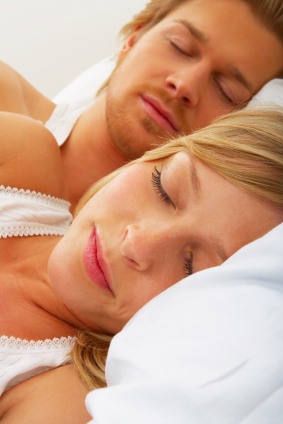Does this sound familiar?
You go to bed… your head hits the pillow and you expect to fall asleep within minutes. You wait… and wait… and nothing. The minutes on the clock turn to hours as you lay there, exhausted, but unable to fall asleep.
If you answered yes, you’re not alone. It happens to most of us at least once a week.
The occasional insomnia, while frustrating, is normal. Statistics show nearly 30% of adults sleep less than 6 hours a day.1
But some of these people don’t have problems sleeping. They just choose to sleep less.
These “short sleepers,” claim they’re more accomplished and healthy with less sleep. They say they have more time to spend on their hobbies, to exercise, and to eat healthy. That their all-around wellness is better.
But are 5 to 6 hours of sleep really enough?
What’s more, are “short sleepers” healthier than the rest of us who prefer our 8 hours? And how is our health affected if insomnia prevents us from getting a full night’s rest?
This topic was presented at the American College of Cardiology’s 2012 Scientific Session.
Research was shown on the sleeping habits of 3,019 patients over the age of 45. Each was grouped into one of three categories, based on how much sleep they said they get each night:
1) Fewer than six hours;
2) Between six and eight hours;
3) Over eight hours.
Analysis showed one of these groups was most at risk for stroke, heart attack, and congestive heart failure.
Can you guess which one?
Group 1. Those who slept less were most at risk.2
In fact, they were found twice as likely to have a stroke or heart attack. And over 1.6 times more likely to develop congestive heart failure.2
Investigators accounted for heart risk factors so as not to skew the results.
“We now have an indication that sleep can impact heart health, and it should be a priority,” says Dr. Rohit Arora.3
Dr. Arora was lead investigator for the study. He is chairman of cardiology and professor of medicine at the Chicago Medical School. He suggests:
“Based on these findings, it seems getting 6 to 8 hours of sleep everyday probably confers the least risk for cardiovascular disease over the long term.”3
Self-professed “short sleepers” should take heed:
“Out of every 100 people who believe they only need five or six hours of sleep a night, only about five people really do,” says Daniel J. Buysse, a past president of the American Academy of Sleep Medicine.3
Besides heart problems, people who don’t get enough sleep are more likely to suffer from chronic diseases such as diabetes, depression, and obesity.
The American College of Cardiology’sfindings are consistent with dozens of similar studies. One in particular stands out. It’s fromWarwick Medical School in the United Kingdom.4
As reported in the European Heart Journal, five researchers analyzed data from 15 different studies conducted between 1966 and 2009. The 474,684 male and female participants studied came from eight different countries.
The researchers found that those who sleep five hours or less per night are more likely to develop (or die from) heart disease, heart failure, and stroke. 4
And on the flip side, “Currently, there is no evidence that sleeping habitually between 6 and 8 [hours] per day in an adult is associated with harm and long-term health consequences.”4
Wake-up Call
From time to time, we all may need help falling asleep… or staying asleep.
Forget sleeping pills and their side effects of dependence, other drug interactions, and withdrawal symptoms.5
There are plenty of healthy, natural choices to help aid sleep.
A few examples are:
- Organic tart cherries and cherry juice.
- Lemon balm or chamomile tea.5
- Valerian root or melatonin supplements.
The amino acid tryptophan helps to make serotonin in the body. Serotonin is thought to aid in healthy sleep.6
Four foods naturally high in the amino acid tryptophan are:
- Spirulina
- Spinach
- Egg whites
- Turkey7
In addition to natural foods and supplements, try staying away from electronics for an hour before bedtime. Turn lights down or off when getting ready for bed. Take a warm bath or indulge in some quiet time. These things will send messages to your brain and body that it’s time to fall asleep.
[Editor’s Note: Stress is another reason you might not be sleeping well. Our latest research has uncovered two important minerals that promote relaxation and calmness. Plus common foods that may be elevating your stress hormones and keeping you from getting the rest you need. Find out what they are and more, here.]References:
1http://www.cdc.gov/features/dssleep/
2http://www.cardiosource.org/News-Media/Media-Center/News-Releases/2012/03/Sleep_CV_Outcomes.aspx
3http://online.wsj.com/article/SB10001424052748703712504576242701752957910.html
4http://eurheartj.oxfordjournals.org/content/32/12/1484.full
5http://www.helpguide.org/life/sleep_aids_medication_insomnia_treatment.htm
6http://www.nlm.nih.gov/medlineplus/ency/article/002332.htm
7http://nutritiondata.self.com/foods-000079000000000000000.html
Tweetables:
Patients who slept less than 6 hours per night found 2x as likely to have a stroke or heart attack. Click to Tweet
“Short Sleepers” are more likely to suffer from diseases such as diabetes, depression, and obesity. Click to Tweet
Natural Sleep Aids include tart cherry juice, chamomile tea, or Valerian root supplements. Click to Tweet

